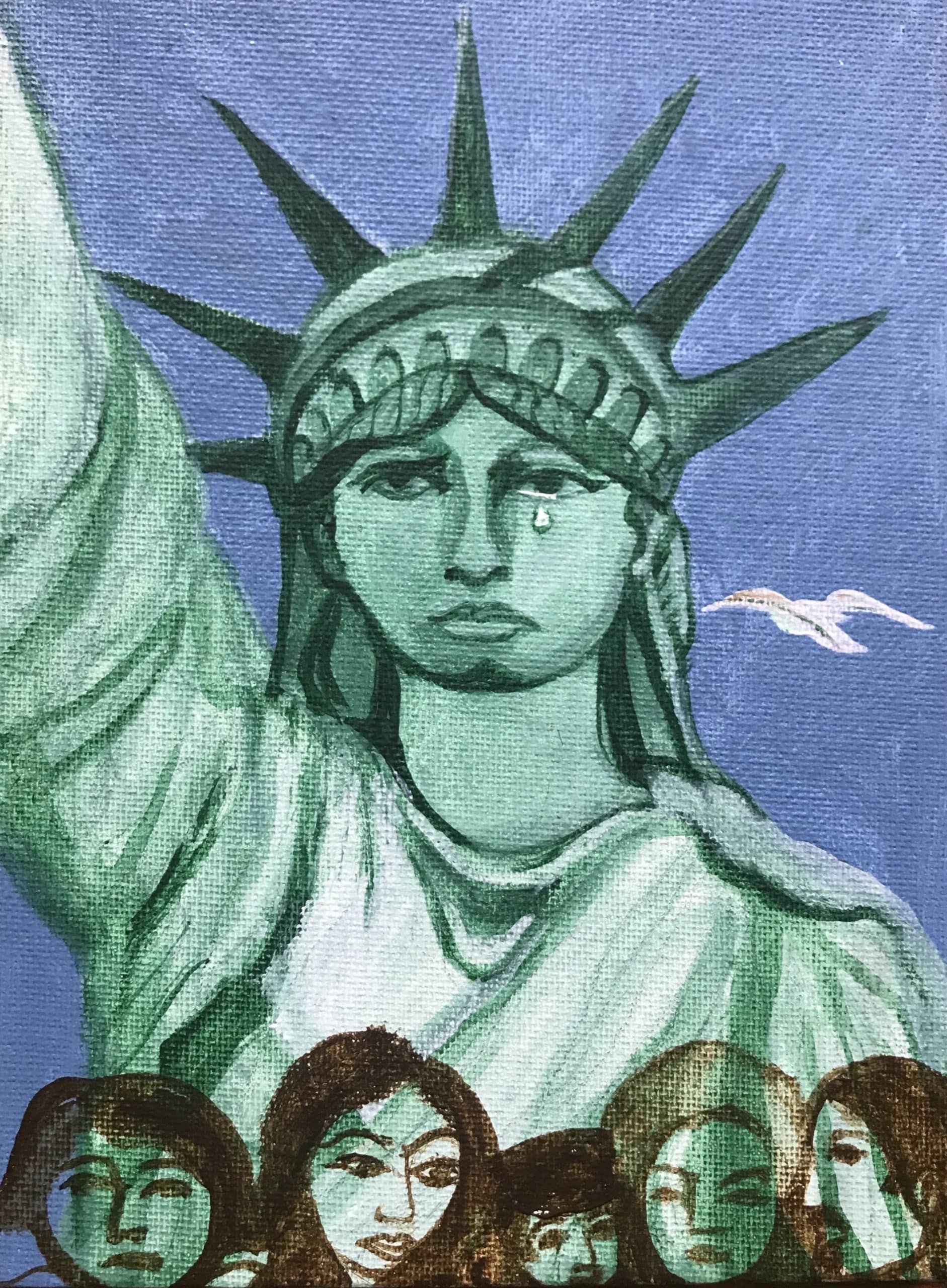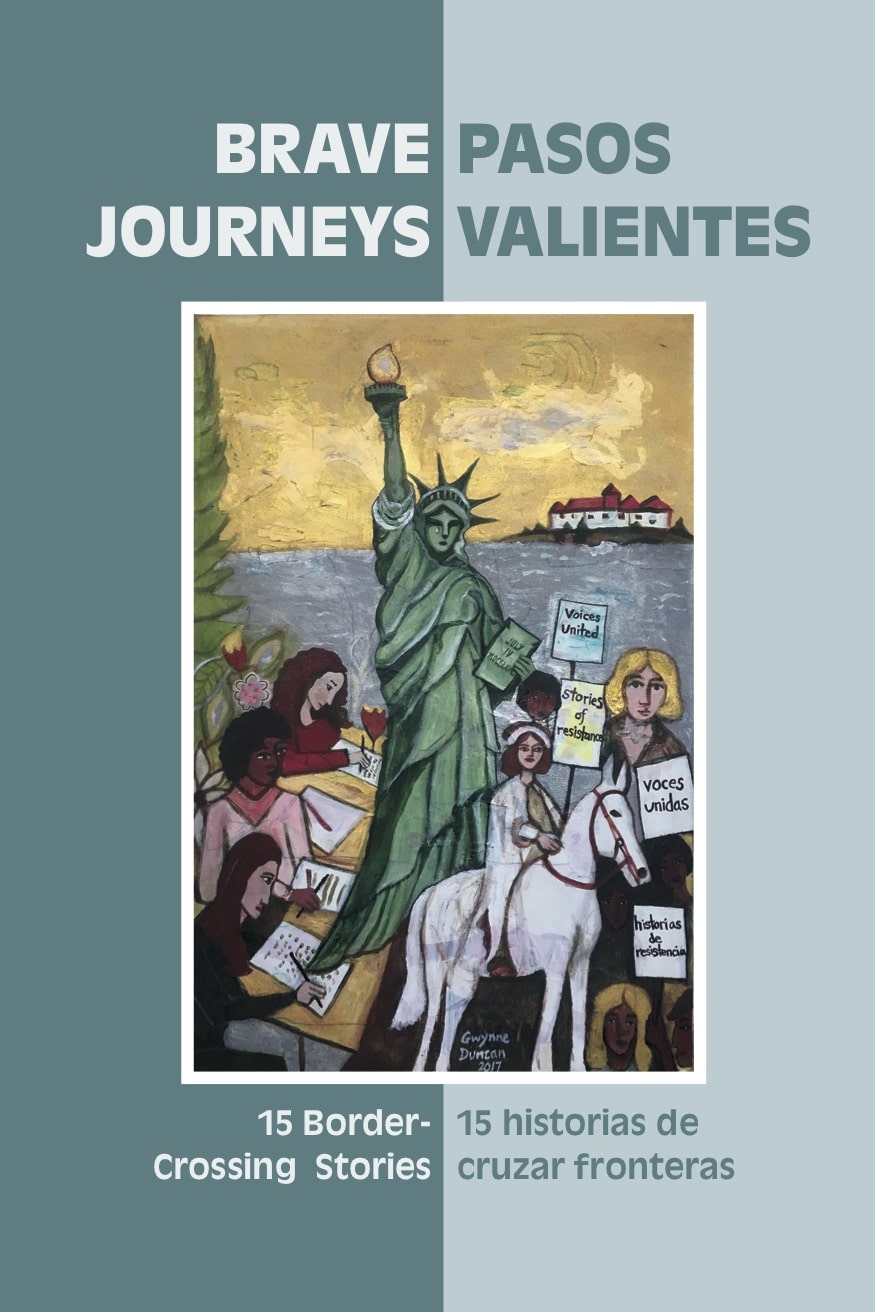

As Herstory Writers Workshop inaugurates a new series for Women’s eNews, we are more conscious than ever of the challenges that we are facing at this moment of time when the Statue of Liberty is crying for us all.
Can our stories help hold up the torch of compassion and welcome, and bring back the light that the oppressors are trying to extinguish? Can they help the most vulnerable among us to hold on through the darkness, uncertainty and danger?
Can memoir become a tool for action? Can the stories of the disenfranchised, the vulnerable and isolated, be shaped in a way that will startle those in power into rethinking policy and practice? Can the power structure be righted if a literature that forces every reader to walk in the storyteller’s shoes is made part of the culture?
These are the questions that set an increasing number of women and girls (and more recently men and boys) upon a two-and-a-half-decade journey of grass roots story-shaping and gathering, as together we worked on developing a tool kit to dare even the most hard-hearted reading or listening stranger to care. Over those decades, thousands of stories have been born in Long Island’s jails, its shelters and school rooms, its union halls and workplaces, libraries and art centers. These stories have been used in prison reform, as part of a training program for officers, and in sensitizing teachers, school counselors and administrators to the realities of the lives of young people who crossed the border by themselves and the children of the incarcerated. They have been used by governmental officials and judges to ensure that the voices of those who lack representation or access are heard. They have been used in the healing of communities divided by violence and hatred.
We are happy to begin this series with stories from Brave Journeys/ Pasos valientes, a book by 15 high school students (ages 14-17) who crossed mountains and deserts and rivers to rejoin their parents – who came to this country to escape danger, with the dream of better life.
As each student put pen to paper, hesitantly at first, not sure what it would mean to bring back memories that were so difficult, magic began to happen. Although the stories were hard, in each new transcription it was the strength and the spirit that began to shine through. Each student who wrote a new page gave the others in the writing circle more courage as the weeks went by, until finally they were ready to read to their ELL teachers, who never had known them in such a deep caring way. In the months that followed they saw their stories turn into a book, to be shared with other students whose stories echoed their own and with students who had no idea of their heroism, beauty and strength. They watched the book that their stories had created make its way into one Long Island school district after another, and finally through First Book, to reach a national audience of educators working in communities where families were unable to buy books for their children.
It is with sadness, but also with urgency and pride, that we anonymously share the writing of these young people, alone, because it wouldn’t be safe to share these stories in a traceable way. We think of a time when the students will again be able to claim their own stories, with their names and photographs attached, as we thank each of these young heroes for the part that they are playing in helping the Statue of Liberty to hold up her torch.
-Erika Duncan, Founder of Herstory Writers Workshop

Story #1: I Will Never Forget You
We reach a stage where we can’t imagine what could happen once we discover the reality of the world. At that moment it doesn’t occur to you that you could know the story of life. First, we remain some time inside the body of another human being. It might not seem like much, but for that human being it might seem a long time they’ll have to wait.
Just like that, the day comes for you to leave that narrow and uncomfortable place. The day your parents cry of happiness and you cry out of joy for the same reason. Nine months inside is a short time, but it’s many years to live.
I was born on February 13, 1999. My father, who was killed, decided before his death that my name had to be ——————————————- in honor of my aunt, who was a nun. My grandmother wanted me to be registered as if I had been born on February 14, but the right thing to do was to be registered the day I was truly born.
Life in our countries is very hard. Because of the economy, many of us run to chase the American dream. Few make it; many die on their way, in the dessert.
But we come with negative thinking. We arrive with fear of being discriminated because we are Hispanic or because we don’t speak the same language they do. We arrive terrified to live in a totally different world, completely different from our countries. But even though it’s not easy, it’s not impossible either.
Many times I find myself analyzing how that life might be, living with different people, with thinking different from mine.
The law of life is to be born, grow up, reproduce and die. And although you don’t know how long you’ll live, life moves step by step, sometimes so fast, it’s impossible to appreciate all the time we lose.
But we should enjoy our childhood because many are born every day but die instantly and don’t ever have the opportunity to live, the way we do.
My childhood was a bit disastrous and sad because I didn’t have the chance to have my father by my side. I was eight years old when I found out that my father was killed. After that, I learned that life is difficult but that everything is possible and that you can move on, and ahead, if you really want to.
I was 16 years old when I asked my mom to bring me to her because I wanted to meet her.
“Let me see what I can do,” she told me, “because you need a lot of money for something like that.”
“Okay,” I said, “I’ll wait for your response.”
As time passed I began to realize that if I came here I would have to leave my grandmother behind. She is like my second mother, someone who gave me so much love.
Three months had passed since I first spoke with my mom about the trip, when the phone rang while I was sitting beside my grandmother in the living room. When I looked at the phone, I could see it was my mom who was calling. Feeling a little sad, I answered.
“Hija,” she said, “get ready because you leave on Monday.”
Very surprised, I answered, “Mom, I don’t want to go anymore.”
“Why?” she asked.
“Because grandma is really sick and I don’t know if I’m going to be able to see her again, or when I’ll be able to come back.”
I wasn’t sure I could do it, but if I had God and grandma’s help, I knew I could do it. My grandma told me that she was scared of me leaving because the journey is very dangerous. I was also very scared because I’d heard many rumors from people about women being raped on the way.
I decided to face my fate, leaving family and loved ones behind to have a new life with very different people. I left on December 18, 2015 at 1:00 a.m. That day I felt a big emptiness in my heart knowing I was leaving my grandmother. She accompanied me to the place where I would meet “the coyote,” how we commonly refer to people who do this type of job in our countries. After approximately four or five hours, the coyote decided it was time to begin the journey.
We had to take a bus to Mexico. When it was time to leave, my grandma was tightly squeezing my hand. As I was about to get on the bus, she whispered in my ear, “Don’t forget me, remember my words, my advice, and scolding. Call me when you feel lonely, remember that I will always be your grandmother, your mother, your confidante.”
All I saw were her tearful eyes, and I hugged her tightly while saying, “Of course I will never forget you, you will always be in my thoughts and I will do everything possible to help you, and pull you ahead, because there’s no way I can ever thank you for everything you’ve done for me.”
TALLER DE ESCRITORES DE HERSTORY / RECUPERANDO A NUESTROS HIJOS
A medida de que el Taller de Escritores de Herstory inaugura una nueva serie para Women's eNews, somos más conscientes que nunca de los desafíos que enfrentamos en este momento en que la Estatua de la Libertad está llorando por todos nosotros.
¿Pueden nuestras historias ayudar a sostener la antorcha de la compasión y la bienvenida, y traer de vuelta la luz que los opresores están tratando de extinguir? ¿Pueden ayudar a los más vulnerables entre nosotros a resistir en la oscuridad, la incertidumbre y el peligro?
¿Pueden las memorias convertirse en una herramienta para la acción? ¿Pueden las historias de los marginados, los vulnerables y aislados, tener una forma que asuste a los que están en el poder a repensar la política y la práctica? ¿Se puede enderezar la estructura de poder si una literatura que obliga a cada lector a caminar en la piel del narrador se hace parte de la cultura?
Estas son las preguntas que plantean un número creciente de mujeres y niñas (y más recientemente hombres y niños) en un viaje de dos décadas y media de formación y recopilación de historias de base, ya que juntos, trabajamos en el desarrollo de un equipo de herramientas para que incluso al lector extraño, más severo o inquebrantable, le interesen estas historias. Durante esas décadas, miles de historias han nacido en las cárceles de Long Island, sus refugios y aulas escolares, sus salas sindicales y lugares de trabajo, bibliotecas y centros de arte. Estas historias se han utilizado en la reforma penitenciaria, como parte de un programa de capacitación para oficiales y en la sensibilización de maestros, consejeros escolares y administradores sobre las realidades de la vida de los jóvenes que cruzaron la frontera solos y los niños de los encarcelados. Han sido utilizados por funcionarios gubernamentales y jueces para garantizar que se escuchen las voces de quienes carecen de representación o acceso. Se han utilizado en la curación de comunidades divididas por la violencia y el odio.
Estamos felices de comenzar esta serie con historias de Brave Journeys / Pasos valientes, un libro con historias acerca de 15 estudiantes de secundaria (entre 14 y 17 años) que cruzaron montañas, desiertos y ríos para reunirse con sus padres, que vinieron a este país para escapar del peligro, con el sueño de una vida mejor.
A medida que cada estudiante ponía un bolígrafo en papel, vacilante al principio, sin saber qué significaría traer recuerdos que eran tan difíciles, la magia comenzó a suceder. Aunque las historias fueron difíciles, en cada nueva transcripción, fue la fuerza y ??el espíritu lo que comenzó a brillar. Cada estudiante que escribió una nueva página les dio a los demás, en el círculo de escritura, más valor a medida que pasaban las semanas, hasta que finalmente estuvieron listos para leer sus historias a sus maestros de ELL, quienes nunca los habían conocido de una manera tan profunda y cuidadosa. En los meses que siguieron, vieron que sus historias se convertían en un libro, que se compartiría con otros estudiantes cuyas historias hicieron eco de las suyas y con estudiantes que no tenían idea de su heroísmo, belleza y fuerza. Vieron el libro que sus historias habían creado llegar a diferentes distritos escolares de Long Island, uno tras otro, y finalmente a través de First Book, llegar a una audiencia nacional de educadores que trabajaban en comunidades donde las familias no podían comprar libros para sus hijos.
Es con tristeza, pero también con urgencia y orgullo, que compartimos anónimamente la escritura de estos jóvenes porque no sería seguro para ellos compartir estas historias de manera rastreable. Esperamos que algún día, estos estudiantes puedan reclamar nuevamente sus propias historias, con sus nombres y fotografías adjuntas, mientras agradecemos a cada uno de estos jóvenes héroes por el papel que están desempeñando para ayudar a la Estatua de la Libertad a sostener su antorcha.
-Erika Duncan, fundadora del taller de escritores de Herstory
*******************************
Historia uno: Nunca te olvidaré
Llegamos a una etapa en donde no nos imaginamos qué podría pasar al momento de descubrir cuál es la realidad del mundo. En ese momento no se te ocurre si podrías llegar a conocer la historia de la vida. Primero, permanecemos un tiempo dentro del cuerpo de otro ser humano. Puede parecer poco, pero para ese ser humano puede parecer muy largo el tiempo que tiene que esperar.
Así, llega el día en que tienes que salir de ese estrecho e incómodo lugar. El día en que tus padres lloran de felicidad y tú gritas por la misma razón. Nueve meses por dentro es poco, pero son muchos años por vivir.
Nací un 13 de febrero de 1999. Mi padre, quien fue asesinado, decidió antes de morir que mi nombre debía ser ——————————————- en honor a una tía que era monja. Mi abuela quería que me registraran como si yo hubiese nacido un 14 de febrero, pero lo correcto es que te registren el día que en verdad naciste.
La vida en nuestros países es muy difícil. A causa de la mala economía, muchos corremos a alcanzar el sueño americano. Pocos lo logran, muchos mueren en el camino, en el desierto.
Pero venimos con un pensamiento muy negativo. Llegamos con el miedo de ser discriminados por ser hispanos o por no hablar el mismo lenguaje que ellos. Llegamos aterrorizados de vivir en un mundo totalmente diferente a nuestros países. Pero, aunque no es fácil, tampoco es imposible.
Muchas veces analizo cómo será esa vida, viviendo con personas distintas, con pensamientos diferentes al mío.
La ley de la vida es que nazcas, crezcas, te reproduzcas y mueras. Y aunque no sabes cuánto tiempo vivirás, la vida transcurre paso a paso y a la vez tan rápido, que es imposible valorar todo el tiempo que perdemos.
Pero deberíamos disfrutar nuestra etapa de la infancia porque muchos nacen día con día, pero mueren al instante y no tienen nunca la oportunidad de vivir, como la tenemos nosotros.
Mi infancia fue un poco desastrosa y triste porque no tuve la oportunidad de tener a mi padre a mi lado. Tenía ocho años cuando me enteré que a mi padre lo habían asesinado. Después de eso aprendí que la vida es difícil pero que todo se puede lograr y que puedes salir adelante si tú te lo propones.
Tenía 16 años cuando le pedí a mi madre que me trajera con ella porque quería conocerla.
—Déjame ver qué puedo hacer —me dijo— porque se necesita mucho dinero para algo así.
—Está bien —le dije— espero su respuesta.
Al pasar el tiempo comencé a analizar que si me venía para acá dejaría a mi abuela sola. Ella es como mi primera madre, alguien que me dio mucho amor.
A los tres meses de haberle comentado a mi mamá acerca del viaje, sonó el teléfono mientras yo estaba sentada al lado de mi abuela en la sala de mi casa. Al ver el teléfono, vi que era mi madre quien llamaba. Sintiéndome un poco triste, le contesté.
—Hija —me dijo— prepárese porque sale el lunes.
Yo, muy sorprendida le contesté,
—Mamá, yo ya no me quiero ir.
—¿Por qué? —me preguntó.
—Porque mi abuela está muy enferma y no sé si la voy a volver a ver, ó cuándo pueda regresar.
Yo no estaba segura de poder hacerlo, pero si tenía la ayuda de Dios y de mi abuela, sabía que lo podía lograr. Mi abuela me decía que tenía miedo de que me viniera porque el camino es muy peligroso. Yo tenía mucho miedo también porque escuchaba muchos rumores de la gente acerca de que violaban a las mujeres en el camino.
Tomé la decisión de enfrentar mi destino, dejando a familiares y seres queridos para tener una nueva vida con personas muy diferentes. Salí un 18 de diciembre de 2015, a la 1:00 a.m. Ese día sentí un gran vacío en mi corazón al saber que dejaba a mi abuela. Ella me acompañó hasta el lugar donde me encontraría con “el coyote”, como comúnmente le decimos en nuestros países a quienes hacen este tipo de trabajo. Pasaron aproximadamente cuatro o cinco horas cuando el señor decidió comenzar con el viaje.
Nos teníamos que ir en autobús a México. Al momento de partir, mi abuela tenía mi mano fuertemente apretada. Cuando estaba a punto de subir al autobús me susurro al oído:
—No me olvides, recuerda mis palabras, mis consejos y regaños. Llámame cuando te sientas sola, recuerda que siempre seré tu abuela, tu madre, tu confidente.
Solo vi sus ojos con lágrimas y la abracé fuertemente diciéndole,
—Claro que nunca te olvidaré, siempre estarás en mis pensamientos y haré todo lo posible por ayudarte y por poder sacarte adelante porque no tengo cómo agradecerte todo lo que has hecho por mí.


